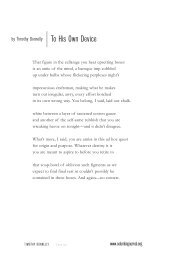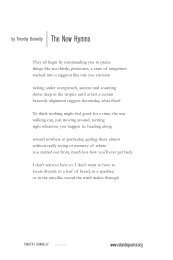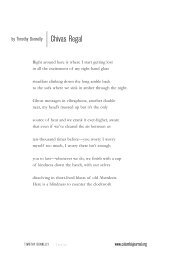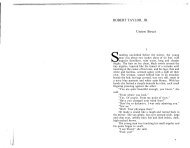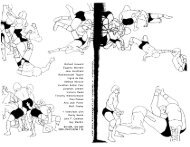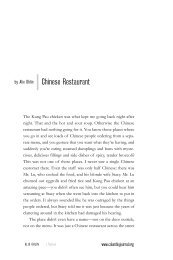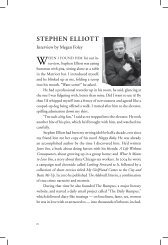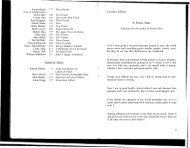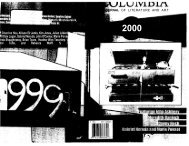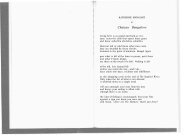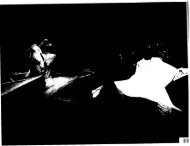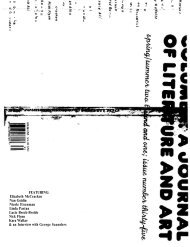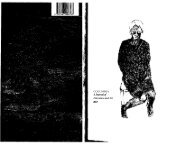Issue 27 - Columbia: A Journal of Literature and Art
Issue 27 - Columbia: A Journal of Literature and Art
Issue 27 - Columbia: A Journal of Literature and Art
Create successful ePaper yourself
Turn your PDF publications into a flip-book with our unique Google optimized e-Paper software.
O<br />
o<br />
66<br />
So this is the man you dreamt I had betrayed.<br />
I couldn't have saved him if I'd stayed.<br />
He's old as his language. On his bony knees<br />
his h<strong>and</strong>s are buckled like wind-blown trees<br />
that were straight in his youth. His eyes are dim,<br />
brimming with water. If you talk to him<br />
he'll mention people whom you never knew,<br />
all in their graves. He hasn't a clue<br />
who you are, or what it is you want<br />
on your duty visits to Talybont.<br />
This is how languages die—the tongue<br />
forgetting what it knew by heart, the young<br />
not underst<strong>and</strong>ing what, by rights, they should.<br />
And vital intelligence is gone for good.<br />
I suppose my heretical conclusion was that languages, like people<br />
whose lives are over, should be allowed to go, not kept technically<br />
<strong>and</strong> artificially alive by machine or government policy. It's not<br />
the poet's primary job to supervise the life-support machine, but<br />
to sing the song <strong>of</strong> tribute at the funeral. And the great gift is<br />
knowing, fully, that no language, however prosperous or imperial,<br />
is going to be able to put <strong>of</strong>f the day when the decision has to be<br />
made about the life-support machine <strong>of</strong> each <strong>and</strong> every one <strong>of</strong> its<br />
speakers. Translators know that the shapes <strong>and</strong> outlines <strong>of</strong> experience<br />
are far more beautiful <strong>and</strong> real than the drapes <strong>of</strong> words<br />
which we put over them. Most <strong>of</strong> us spend our lives admiring the<br />
lovely colors <strong>and</strong> the material <strong>of</strong> the drapes. Translators know that<br />
such weak material crumples to nothing without the eternal forms<br />
behind them.<br />
I've defined the nature <strong>of</strong> translation very broadly, arguing that<br />
cultures survive because <strong>of</strong> internal translation by their poets <strong>and</strong><br />
by sucking in <strong>of</strong> new air from foreign literatures. I want to take<br />
the idea even further <strong>and</strong> argue that the very nature <strong>of</strong> our lives<br />
depends on how good we are as translators. Joseph Brodsky has<br />
written that "Poetry, after all, in itself is a translation." By this, I<br />
underst<strong>and</strong> him to mean that verse is a version <strong>of</strong> nerve-end<br />
responses to the world, filtered throughout the logarithm <strong>of</strong> lan-<br />
guage into a construct which is an equivalent, in some way, to that<br />
original experience. In*Buddhist philosophy, it's only by underst<strong>and</strong>ing<br />
the true nature <strong>of</strong> the mind that reality can be seen accurately.<br />
The "I"—that is, me as a person—is a fiction produced by<br />
the mind, a non-existent entity which leads us to misread ourselves<br />
<strong>and</strong> the world around us. The virtuous life, therefore, is one<br />
which perceives <strong>and</strong> acts most accurately on the nature <strong>of</strong> reality.<br />
The price <strong>of</strong> mistranslating in this realm isn't a bad grade in midterms,<br />
but misery <strong>and</strong> delusion. Our lives themselves <strong>and</strong> not just<br />
our art, therefore, can be said to depend on being good translators.<br />
If I've been able to convey one thing here I hope it's my<br />
conviction that translation isn't just a matter <strong>of</strong> choosing the<br />
right words in English to convey, say,Virgil's hexameters or how to<br />
make one word cover the twenty Innuit nouns for snow. It<br />
permeates the whole range <strong>of</strong> our dealings with language.<br />
Translation doesn't just happen between languages—it's sometimes<br />
needed within one. In the U.K. a movement for Plain English has<br />
been campaigning to remove the gobbledygook from <strong>of</strong>ficial<br />
documents so that people can participate in the social contracts<br />
which bind them. This isn't just a matter <strong>of</strong> simplifying the<br />
vocabulary <strong>of</strong> these papers; it's part <strong>of</strong> changing society from one<br />
dominated by the latinate complexity <strong>of</strong> an imperial power, in<br />
which people don't need to know how they're governed, into a<br />
democracy where all the participants—even the least educated—<br />
underst<strong>and</strong> the structures which protect <strong>and</strong> bind them together.<br />
Translation is not just a matter <strong>of</strong> words. It's far more important.<br />
Which brings me to the title <strong>of</strong> this essay. The Welsh enjoy<br />
their words <strong>and</strong> play with them <strong>of</strong>ten. This may not always be<br />
in the sphere <strong>of</strong> high culture. I once heard about a train<br />
announcement in Llanelli which was "translated" from <strong>of</strong>ficial<br />
British Rail-speak into West Walain. It went "Ladies <strong>and</strong><br />
Gentlemen, There's been a change <strong>of</strong> platform. Ev'ryone over b'<br />
ere come over b' there <strong>and</strong> ev'ryone over b'there, come over b'ere."<br />
Not the Queen's English, but nobody missed their train. "Whose<br />
coat is that jacket? Whose hat is that cap?" is another South Walian<br />
joke. It shows our fascination for the slightly different angles at<br />
which we see the world, according to which word we use to



